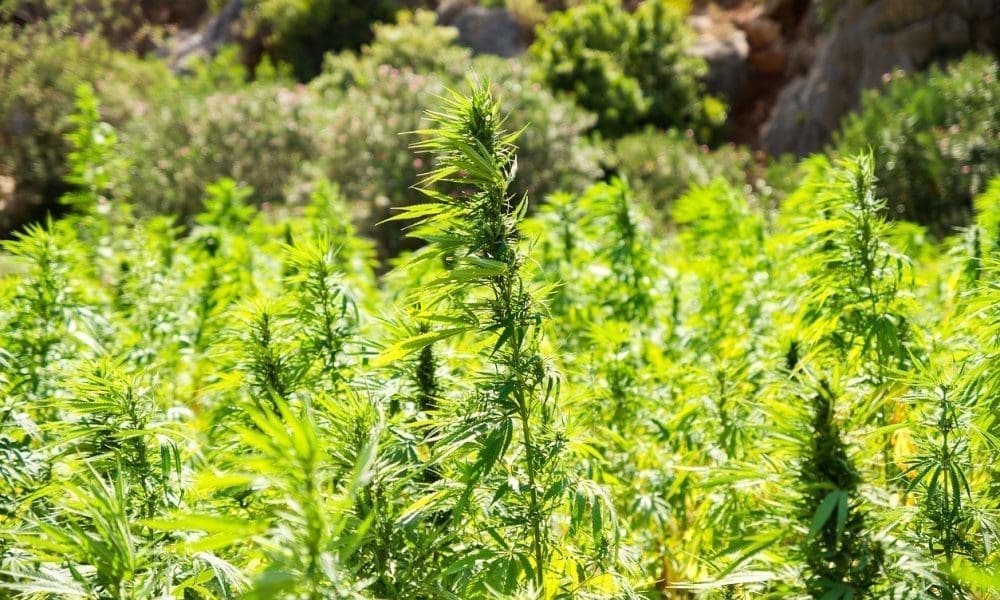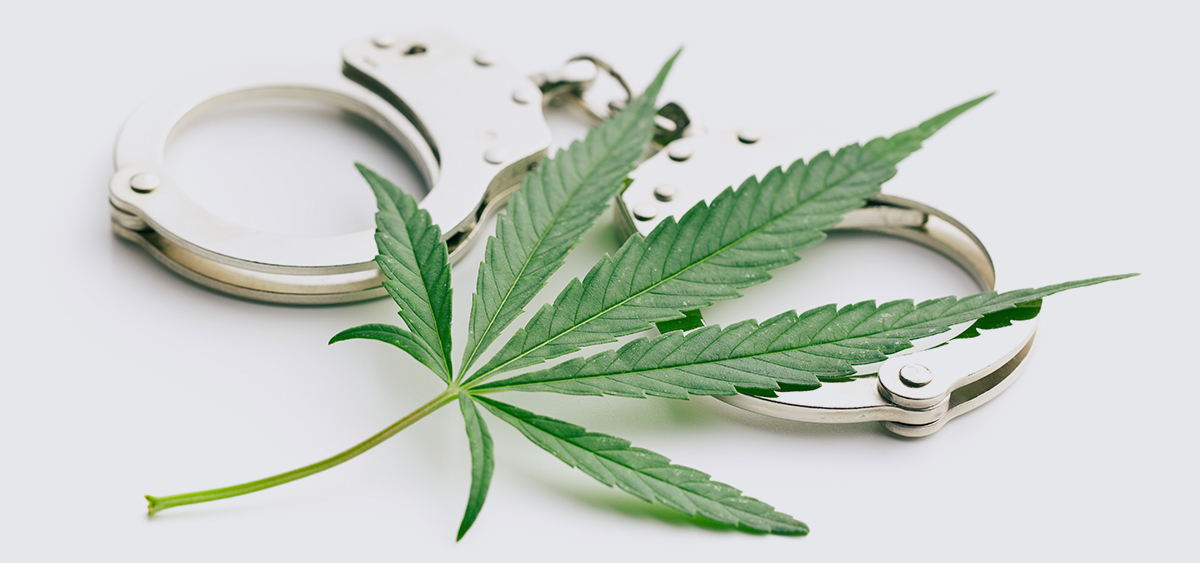featured
Rand Paul Says GOP Congressman’s Hemp Ban Bill Would ‘Completely Destroy’ The Industry
Published
7 hours agoon

A GOP senator says that an effort to ban THC hemp products that’s advancing in the Republican-controlled House would “completely destroy” the industry.
Sen. Rand Paul (R-KY) told Marijuana Moment on Thursday that he’s opposed to cannabis language included in a House agriculture spending bill that’s being championed by noted prohibitionist Rep. Andy Harris (R-MD).
Asked for his thoughts on the proposal, the senator said “they have an appropriations bill that I think would completely destroy the American hemp industry.”
“I don’t know how you’d be able to sell CBD oil with that,” he said, echoing arguments from certain hemp stakeholders who say the legislation as currently drafted would ban not only synthetic intoxicating cannabinoids like delta-8 THC but also most hemp-derived non-intoxicating cannabidiol products.
While Harris amended report language attached to the bill that clarifies it’s not the intent of the committee to stop people from accessing “industrial or nonintoxicating hemp-derived cannabinoid products with trace or insignificant amounts of THC,” the bill itself still says that products containing any “quantifiable” amounts of THC couldn’t be marketed. And it’s rare to find CBD items without any natural traces of THC.
Paul recently filed a bill that would go in the opposite direction of Harris’s ban, proposing to triple the concentration of THC that the crop could legally contain, while addressing multiple other concerns the industry has expressed about federal regulations.
The senator introduced the legislation, titled the Hemp Economic Mobilization Plan (HEMP) Act, last week. It mirrors versions he’s sponsored over the last several sessions.
Hemp and its derivatives were legalized under the 2018 Farm Bill, but the industry has experienced multiple setbacks in the years since—and the proliferation of intoxicating cannabinoid products has led to pushes in Congress and state legislatures across the country to reign in the largely unregulated market.
Harris, for his part, told Marijuana Moment last week that he’s not concerned about any potential opposition in the Senate—and he also disputed reports about the scope of what his legislation would do to the industry.
The 2026 spending legislation that contains provisions to ban consumable hemp products with any quantifiable amount of THC advanced out of the House Appropriations Committee on Monday and is now headed to the floor before potentially getting taken up by the Senate.
Harris—who serves as chair of the House Appropriations Subcommittee on Agriculture, Rural Development, Food and Drug Administration, and Related Agencies—also noted in the interview with Marijuana Moment that there “was no opposition [to the hemp provisions] that came up in committee, that’s for sure.”
He also briefly weighed in on the Texas governor’s recent veto of a bill to recriminalize hemp products with any THC—simply stating that he’s “not paying attention to what a single state is doing” while he focuses on enacting the proposed federal ban.
The language in the congressional bill, meanwhile, would still effectively eliminate the most commonly marketed hemp products within the industry, as even non-intoxicating CBD items that are sold across the country typically contain trace amounts of THC. Under current law, those products are allowed if they contain no more than 0.3 percent THC by dry weight.
The proposed policy championed by Harris would drastically change that. It would instead maintain the legal status of “industrial hemp” under a revised definition that allows for the cultivation and sale of hemp grown for fiber, whole grain, oil, cake, nut, hull, microgreens or “other edible hemp leaf products intended for human consumption.”
The Congressional Research Service (CRS) released a report this month stating that the legislation would “effectively” prohibit hemp-derived cannabinoid products. Initially it said that such a ban would prevent the sale of CBD as well, but the CRS report was updated to exclude that language for reasons that are unclear.
The hemp language is largely consistent with appropriations and agriculture legislation that was introduced, but not ultimately enacted, under the last Congress.
Hemp industry stakeholders rallied against that proposal, an earlier version of which was also included in the base bill from the subcommittee last year. It’s virtually identical to a provision of the 2024 Farm Bill that was attached by a separate committee last May via an amendment from Rep. Mary Miller (R-IL), which was also not enacted into law.
There are some differences between the prior spending bill and this latest version for 2026, including a redefining of what constitutes a “quantifiable” amount of THC that’d be prohibited for hemp products.
It now says that a quantifiable amount is “based on substance, form, manufacture, or article (as determined by the Secretary of Health and Human Services in consultation with the Secretary of Agriculture),” whereas it was previously defined as an amount simply “determined by the Secretary in consultation with the Secretary of Health and Human Services.”
The proposed legislation also now specifies that the term hemp does not include “a drug that is the subject of an application approved under subsection (c) or (j) of section 505 of the Federal Food, Drug, and Cosmetic Act (21 U.S.C. 355),” which seems to carve out an exception for Food and Drug Administration- (FDA) approved drugs such Epidiolex, which is synthesized from CBD.
A leading alcohol industry association, meanwhile, has called on Congress to dial back language in the House spending bill that would ban most consumable hemp products, instead proposing to maintain the legalization of naturally derived cannabinoids from the crop and only prohibit synthetic items.
Wine & Spirits Wholesalers of America (WSWA) President and CEO Francis Creighton said in a press release that “proponents and opponents alike have agreed that this language amounts to a ban.”
“By pushing a rapidly evolving industry back into the shadows, Congress is creating even more chaos in the marketplace, undermining state initiatives and punishing responsible actors,” he said. “We urge the full House to reconsider this approach. States can regulate intoxicating products safely and effectively through systems that preserve consumer trust and public safety. It’s time for Congress to follow their lead, not override their authority.”
Members of WSWA also met with lawmakers and staffers in April to advocate for three key policy priorities that the group says is based on “sound principles of alcohol distribution.” They include banning synthetic THC, setting up a federal system for testing and labeling products and establishing state-level power to regulate retail sales.
Separately, key GOP congressional lawmakers—including one member who supports marijuana legalization—don’t seem especially concerned about provisions in the bill despite concern from stakeholders that it would put much of the hemp industry in jeopardy by banning most consumable products derived from the plant.
—
Marijuana Moment is tracking hundreds of cannabis, psychedelics and drug policy bills in state legislatures and Congress this year. Patreon supporters pledging at least $25/month get access to our interactive maps, charts and hearing calendar so they don’t miss any developments.![]()
Learn more about our marijuana bill tracker and become a supporter on Patreon to get access.
—
Jonathan Miller, general counsel of the U.S. Hemp Roundtable, told congressional lawmakers in April that the market is “begging” for federal regulations around cannabis products.
At the hearing, Rep. James Comer (R-KY) also inquired about FDA inaction around regulations, sarcastically asking if it’d require “a gazillion bureaucrats that work from home” to regulate cannabinoids such as CBD.
A report from Bloomberg Intelligence (BI) last year called cannabis a “significant threat” to the alcohol industry, citing survey data that suggests more people are using cannabis as a substitute for alcoholic beverages such a beer and wine.
Last November, meanwhile, a beer industry trade group put out a statement of guiding principles to address what it called “the proliferation of largely unregulated intoxicating hemp and cannabis products,” warning of risks to consumers and communities resulting from THC consumption.
The LCB contributed reporting from Washington, D.C.
Photo courtesy of Pixabay.

Author: mscannabiz.com
MScannaBIZ for all you Mississippi Cannabis News and Information.
You may like
-


10 Alabama CBD Stores, Vape Shops Raided; 4 Hemp Businesses Sue State
-


Four Arrested for CBD Distillate Theft Valued at $3.6M
-


ALEA raids 9 stores across Alabama for allegedly violating state marijuana laws
-


What’s Changed Since Connecticut Legalized Adult-Use Marijuana 4 Years Ago?
-


Police: Man caught with 250 pounds of marijuana
-


California Cannabis Excise Tax Hike Takes Effect as Consumers Face Mounting Cost-of-Living Crisis
featured
10 Alabama CBD Stores, Vape Shops Raided; 4 Hemp Businesses Sue State
Published
13 minutes agoon
June 30, 2025
Special agents with the Alabama Law Enforcement Agency (ALEA) coordinated with local and federal agencies to carry out a series of search warrants on June 23, seizing myriad products at smoke and vape shops in five cities.
ALEA’s State Bureau of Investigation (SBI) spearheaded the multiagency operation with support from the Alabama attorney general’s office, the Alabama Drug Enforcement Task Force, the Federal Bureau of Investigation (FBI), the 12th and 19th Judicial Circuit District Attorney’s offices, the sheriff’s offices in Coffee and Chilton counties, and police departments in Troy, Enterprise, Clanton, Wetumpka and Montgomery.
SBI Major Crimes Chief Shawn Loughridge said during a June 27 press conference that the search warrants, which were executed at 10 businesses, resulted from a nearly yearlong investigation that launched after numerous complaints from community members arose in those five cities.
The SBI special agents confiscated “significant” quantities of cannabis, drug paraphernalia and other illegal drug-related items, yet the investigation remains ongoing, he said.
“No arrests have been made at this time,” Loughridge said. “However, this evidence collected this week represents a major step forward in holding these businesses accountable and protecting the health and safety of our communities.”
The seized products included what law enforcement officials said were packaged and marketed as hemp but contained THC potencies that violated Alabama law, according to ALEA. Loughridge said those potencies were determined after special agents and local law officers conducted controlled purchases to analyze and determine the THC content.
Under Alabama law, only hemp products containing less than 0.3% delta-9 THC are legal to sell outside the state’s licensed medical cannabis market, which has yet to commence commercial sales amid ongoing legal challenges to the state’s licensing process.
Alabama’s hemp law is based on the 2018 Farm Bill, which federally legalized hemp, incorporating a preharvest field test for the 0.3% THC potency. The legislation does not regulate finished products.
SBI Director Chris Inabinett told reporters during the press conference that “no amount of clever packaging or marketing” is going to change the legal definition of hemp.
“We now have the technology and facilities at ALEA to conduct accurate, presumptive analysis of THC levels in these products,” he said. “These search warrants were not meant to punish business owners; they were issued in response to numerous community complaints. This is about public safety.”
Inabinett also said that certain intoxicating cannabinoid products are being sold in Alabama in packages that resemble candy, snacks and other popular food items attractive to children.
Alabama Attorney General Steve Marshall said that he wanted to make something “abundantly clear” during the press conference.
“This is not hemp. This is marijuana,” he said. “This is an illegal marijuana operation. Despite the labeling, despite what may be represented, this is illicit drugs. And, as opposed to going to a local drug dealer to buy your marijuana, this was going to a storefront. Either way, it’s illegal activity for which we’ll be vigilant in making sure that we enforce.”
The multiagency operation unfolded one week before legislation to ban smokable and synthetic hemp products goes into effect on July 1.
House Bill 445, signed by Gov. Kay Ivey, also authorizes Alabama’s Alcoholic Beverage Control (ABC) Board to license and oversee consumable hemp product manufacturers, wholesalers and retailers, allowing the board to conduct inspections and seize unlawful hemp products without a warrant.
In addition, the legislation will place a 10% excise tax on hemp product sales, impose testing and labeling requirements, prohibit sales to those under 21 years old, and ban online sales and direct deliveries.
Four companies filed a lawsuit against Ivey and Marshall on June 27 in the Circuit Court of Montgomery County, claiming the legislation is unconstitutional, asking the court for a temporary restraining order or a preliminary injunction.
While certain provisions of the signed bill don’t take effect until Jan. 1, 2026, an attorney general spokesperson from Marshall’s office clarified that possessing or selling prohibited products under H.B. 445 on or after July 1 could subject an individual to a Class C felony—which carries a 1-year to 10-year prison sentence—WSFA reported.
The plaintiffs argued in the lawsuit that they’re not sure whether they’ll be violating HB 445’s smokable and synthetic hemp ban because the law’s definitions are “so vague.”
“It’s impossible to tell whether a particular product is included in the statewide bans,” according to the suit. “As they exist, H.B. 445’s [bans] fail to provide fair notice of what products are prohibited and open the door for arbitrary enforcement in violation of the Due Process Clause.”
The plaintiffs also argue that since one must possess something to transport or ship it, H.B. 445 violates the Dormant Commerce Clause and the 2018 Farm Bill, which explicitly protects the interstate commerce of federally compliant hemp through states and territories.
During the press conference on last week’s raids, 12th Judicial Circuit District Attorney James Tarbox said the search warrants and enforcement efforts have nothing to do with H.B. 445.
“When you have a billboard that says ‘dispensary-grade THC,’ that means one thing to me: You’re selling marijuana,” he said. “When you have a billboard that says ‘inhale the good stuff,’ that means one thing to me: You’re selling marijuana. When your business is selling synthetic urine and drug screen masking agents, that means one thing to me: You’re up to no good. It’s about protecting the public and upholding the rule of law here in the state of Alabama.”
The day after the press conference, the Alabama Cannabis Coalition claimed it had been told by an “informant” that the raids would continue.
“We do not know when, but we would assume they are not going to waste any time flexing their muscles after the press conference yesterday,” the advocacy and policy reform group posted on social media. “Word on the street, they are targeting any business that is selling flower. Their plan is the same as 6/23/2025, confiscate flower and all cash in the business. Spread the word, protect yourselves and be safe. The long arm of the law has no boundaries.”

Author: mscannabiz.com
MScannaBIZ for all you Mississippi Cannabis News and Information.
featured
Four Arrested for CBD Distillate Theft Valued at $3.6M
Published
1 hour agoon
June 30, 2025
The Georgia Department of Agriculture (DOA) said four people have been arrested for the theft of about 3,000 liters of hemp-derived CBD distillate with an estimated value of $3.6 million, WSBTV.com reports.
The theft happened in January at the Irwin County, Georgia-based hemp processing facility Second Century Ag, where officers responded to reports of the theft and confirmed that 3,000 liters of CBD distillate had been stolen from a warehouse. Investigators said two perpetrators used a rented U-Haul to transport the stolen goods to another county, where they switched vehicles, before driving the CBD distillate to Dallas, Texas.
Police arrested four people in Texas over the incident and they were all extradited to Georgia. The two suspects who are accused of actually stealing the CBD distillate are facing felony burglary charges, while two other suspects who were linked to the plot via peer-to-peer money transfers are facing both burglary and conspiracy charges. Prosecutors believe that one of the suspects, Aaron Wayne Smith, 29, was the main orchestrator of the plot, and are pursuing the following charges against him:
- Second Degree Burglary
- Conspiracy to Commit a Crime
- Use of a Communication Facility in Committing or Facilitating a Drug Transaction
- Possession of a Controlled Substance with Intent to Distribute
- Felony Theft by Taking
Georgia Agriculture Commissioner Tyler J Harper said in a statement he is “incredibly proud” of the investigation, highlighting DOA’s cooperation with the Texas Department of Public Safety, the Texas Rangers, and the Irwin County Sheriff’s Office.
“In Georgia we are sending a clear message, if you attempt to use agriculture as a cover for criminal activity – we will catch you and you will go to prison.” — Harper, in a press release
Cannabis remains illegal in Georgia except under the state’s limited medical cannabis program. Officials last year added dispensaries to the program after the total patient count exceeded 25,000, the threshhold set by the state for triggering expansion.
Meanwhile, lawmakers considered a bill this year to ban THC from all hemp products sold in the state but the Senate-passed proposal ultimately stalled in a House committee.

Author: mscannabiz.com
MScannaBIZ for all you Mississippi Cannabis News and Information.
featured
What’s Changed Since Connecticut Legalized Adult-Use Marijuana 4 Years Ago?
Published
3 hours agoon
June 30, 2025
Not only have recreational sales increased, but medical purchases have made up less than half of the state’s cannabis market retail sales since May 2023.
By Sasha Allen, CT Mirror
July 1 marks four years of legalized recreational cannabis use in Connecticut, and with legalization came major changes to the medical marijuana market.
A law enacted in 2012 allowed the purchase and use of cannabis for medical reasons only. But in 2021, the state legalized recreational use for everyone 21 and older. Statewide recreational retail sales began in January 2023, and by May 2023, recreational sales accounted for the majority of state cannabis retail sales, a trend that has continued to today.
Connecticut was the 19th state to legalize recreational marijuana.
Under state law, anyone 21 or older without a medical card is allowed to possess up to 1.5 ounces of cannabis flower or other cannabis product equivalent in public and up to 5 ounces in their private residence. Medical cardholders can posses up to 5 ounces of cannabis on their person.
Not only have recreational sales increased, but medical purchases have made up less than half of the state’s cannabis market retail sales since May 2023.
Connecticut was the 19th state to legalize recreational marijuana.
Both medical and recreational dispensaries sell similar products, but medical users who are using the product to treat “debilitating medical conditions” aren’t subject to the cannabis tax. Medical users can also buy other products that recreational users cannot, including capsules, tablets, pills, sublinguals and suppositories.
Medical users are also not subject to potency restrictions, while recreational cannabis is currently capped at 30 percent THC for cannabis flower and 60 percent THC for concentrate products other than vapes. However, as of October 1, 2025, the cap for raw flower will be raised to 35 percent THC and 70 percent THC for concentrates other than vapes.
The cannabis tax is dependent on both the product and the amount of THC; edible products are taxed the most heavily per milligram of THC and plant products the least. For an eighth of flower that’s 15 percent THC, for the tax currently sits at around 9.4 percent, fluctuating based on product pricing. Edibles are subject to a tax of $0.0275 per milligram of the product’s total THC content.
Medical card holders are required to apply for renewal annually, which involves a consultation fee with health care providers that can range from $100 to $350 for users 18 and older. For users under 18, users must have a condition specified by the legislature for medical usage as well as parental consent and a caregiver arrangement.
Because cannabis usage is federally illegal, medical card holders are prohibited from purchasing firearms, and everyone applying for a firearm is required to disclose their usage of cannabis and other federally controlled substances. Federal law bars all cannabis users from owning a firearm.
Each hybrid or recreational cannabis retailer registered in Connecticut must pay the cannabis tax, which varies by product. The state cannabis tax brought in $21.3 million in state revenue for FY 2024.
Overall, the sales tax—along with state sales tax, municipality sales tax and licensing and conversion fees for dispensaries—brought in $49.4 million in cannabis revenue for FY 2024.
While there are dozens of products on the market, usable cannabis flower, which is just the dried plant, brings in the most sales across the medical and recreational markets. Overall, in May 2025, recreational cannabis retail sales were $18.7 million. Medical retail sales were $6.6 million.
There is only one exclusively medical dispensary in the state. The rest of the dispensaries have transitioned and cater to both the recreational market and the medical market as hybrid dealers, or just the recreational market.
Statewide, there are 36 recreational dispensaries and 35 hybrid dealers. However, the number of dispensaries fluctuates. Back in January 2023, only nine hybrid dispensaries existed. Numbers from around February 2025 showed 64 dispensaries in the state—eight fewer than are currently open.
This article first appeared on CT Mirror and is republished here under a Creative Commons Attribution-NoDerivatives 4.0 International License.
Photo courtesy of Philip Steffan.

Author: mscannabiz.com
MScannaBIZ for all you Mississippi Cannabis News and Information.

10 Alabama CBD Stores, Vape Shops Raided; 4 Hemp Businesses Sue State

Four Arrested for CBD Distillate Theft Valued at $3.6M

ALEA raids 9 stores across Alabama for allegedly violating state marijuana laws

What’s Changed Since Connecticut Legalized Adult-Use Marijuana 4 Years Ago?

Police: Man caught with 250 pounds of marijuana

California Cannabis Excise Tax Hike Takes Effect as Consumers Face Mounting Cost-of-Living Crisis

First legal cannabis dispensary to open in Genesee County

Judge Dismisses Lawsuit Seeking to Invalidate Nebraska Medical Cannabis Reforms

Mike Tyson leads athletes in push for marijuana reform: 'Cannabis is not a drug'

Rand Paul Says GOP Congressman’s Hemp Ban Bill Would ‘Completely Destroy’ The Industry

Cannabis legalization could help GOP win young voters, former congressman says (Newsletter: June 30, 2025)

Alabama Expected to Issue Medical Cannabis Dispensary Licenses Soon

Mississippi AG Says Intoxicating Hemp Products Are ‘Prohibited’ Under State Law

RAW Rolling Papers Founder Buys High Times

Jones Soda Co. Sells Mary Jones THC Beverage Brand

Chicago Police Can’t Search Vehicles Based on Smell of Raw Cannabis Under New Rules

Tilray Brands Subsidiary is First Company in Italy Approved to Distribute Medical Cannabis Flower

San Diego heart surgeon weighs in on marijuana and heart disease risk

Michigan Cannabis Sales Fall, But Consumers Are Buying More at Dispensaries

Montana Gov. Vetoes Bill on Tribal Cannabis Agreements

Federal Court Rules Arkansas’ Ban on Hemp-Derived THC Can Move Forward

Thailand Will Reclassify Cannabis as Narcotic

Heart surgeon weighs in on marijuana and heart disease risk

Supreme Court Declines to Hear Case Challenging Mississippi’s Medical Marijuana Advertising Ban

Alert: Department of Cannabis Control updates data dashboards with full data for 2023

Connecticut Appoints The US’s First Cannabis Ombudsperson – Yes there is a pun in there and I’m Sure Erin Kirk Is Going To Hear It More Than Once!

5 best CBD creams of 2024 by Leafly

Free delta-9 gummies from Bay Smokes

EU initiative begins bid to open access to psychedelic therapies
New Study Analyzes the Effects of THCV, CBD on Weight Loss

Mississippi city official pleads guilty to selling fake CBD products

Curaleaf Start Process Of Getting Their Claws Into The UK’s National Health System – With Former MP (Resigned Today 30/5/24) As The Front Man

May 2024 Leafly HighLight: Pink Runtz strain

5 best autoflower seed banks of 2024 by Leafly

Horn Lake denies cannabis dispensary request to allow sale of drug paraphernalia and Sunday sales | News

Discover New York’s dankest cannabis brands [September 2024]

Press Release: CANNRA Calls for Farm Bill to Clarify Existing State Authority to Regulate Hemp Products

Nevada CCB to Accept Applications for Cannabis Establishments in White Pine County – “Only one cultivation and one production license will be awarded in White Pine County”

Local medical cannabis dispensary reacts to MSDH pulling Rapid Analytics License – WLBT

6 best CBD gummies of 2024 by Leafly

5 best THC drinks of 2024 by Leafly

The Daily Hit: October 2, 2024

5 best delta-9 THC gummies of 2024 by Leafly

Weekly Update: Monday, May 13, 2024 including, New Guide for Renewals & May Board meeting application deadline

People In This State Googled ‘Medical Marijuana’ The Most, Study Shows

Thailand: Pro-cannabis advocates rally ahead of the government’s plan to recriminalize the plant

PRESS RELEASE : Justice Department Submits Proposed Regulation to Reschedule Marijuana

Press Release: May 9, STIIIZY and Healing Urban Barrios hosted an Expungement Clinic & Second Chance Resource Fair
Trending
-

 California Cannabis Updates1 year ago
California Cannabis Updates1 year agoAlert: Department of Cannabis Control updates data dashboards with full data for 2023
-

 Breaking News1 year ago
Breaking News1 year agoConnecticut Appoints The US’s First Cannabis Ombudsperson – Yes there is a pun in there and I’m Sure Erin Kirk Is Going To Hear It More Than Once!
-

 best list11 months ago
best list11 months ago5 best CBD creams of 2024 by Leafly
-

 Bay Smokes1 year ago
Bay Smokes1 year agoFree delta-9 gummies from Bay Smokes
-

 Business9 months ago
Business9 months agoEU initiative begins bid to open access to psychedelic therapies
-

 cbd1 year ago
cbd1 year agoNew Study Analyzes the Effects of THCV, CBD on Weight Loss
-

 Mississippi Cannabis News1 year ago
Mississippi Cannabis News1 year agoMississippi city official pleads guilty to selling fake CBD products
-

 Breaking News1 year ago
Breaking News1 year agoCuraleaf Start Process Of Getting Their Claws Into The UK’s National Health System – With Former MP (Resigned Today 30/5/24) As The Front Man



